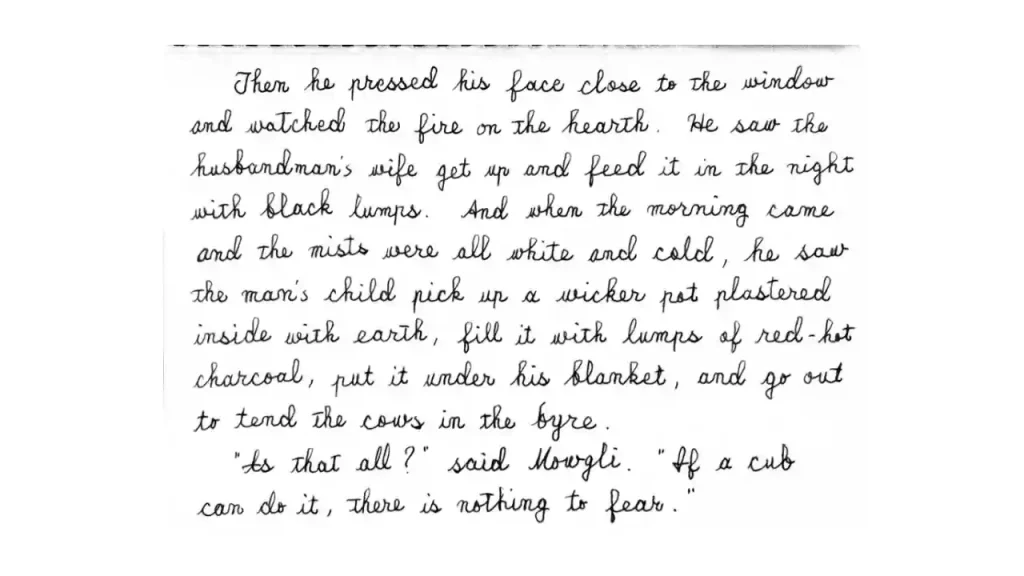Then he pressed his face close to the window and watched the fire on the hearth.
The Jungle Book
- Japanese grammar
- subject: モウグリ
- predicate: みはる
- modifier: ひを
日本語訳:
そのあと、モウグリは窓に顔を押し付けて、室内の暖炉の火を見張りました。
- Kanji, Hiragana
- 見張る(みはる, watch/guard)
“Miharu” (見張る) is a verb that means to keep watch over, to guard, or to monitor someone or something carefully, often to prevent danger or wrongdoing. It can also imply being alert or vigilant, such as watching over children, guarding a place, or keeping an eye on suspicious activity.
He saw the husbandman’s wife get up and feed it in the night with black lumps.
- subject: ひゃくしょうのつま
- predicate: とうにゅうする
- modifier: ひに・かたまりを
モウグリは見ました。百姓の妻が立ち上がり、暖炉の火に黒いかたまりを投入するのを。
- 投入する(とうにゅうする, invest / put in / deploy)
And when the morning came and the mists were all white and cold, he saw the man’s child pick up a wicker pot plastered inside with earth, fill it with lumps of red-hot charcoal, put it under his blanket, and go out to tend the cows in the byre.
- subject: こども
- predicate: そとにでる
- modifier: ポットを・ブランケットにいれて
朝が来て霧が立ちこめると、人間の子供が、内側に土が塗ってある枝編みのポットを取って、赤く焼けた炭のかたまりをポットにいっぱいにして、ブランケットの中に入れて、牛舎にいる牛の世話をしに外へ出ました。
- 霧が立ち込める(きりがたちこめる, fog settles / fog hangs thick)
“Kiri ga tachikomeru” (霧が立ち込める) is a descriptive phrase meaning a thick fog spreads and lingers, often covering an area so densely that visibility is significantly reduced. It evokes a scene where fog envelops the surroundings, creating a quiet, mysterious, or even eerie atmosphere. This expression can also be used metaphorically to describe unclear or uncertain situations.
“Is that all?” said Mowgli. “If a cub can do it, there is nothing to fear.”
「それだけ?子供にできるのなら、心配ないや」モウグリが言いました。
So he strode round the corner and met the boy, took the pot from his hand, and disappeared into the mist while the boy howled with fear.
- subject: モウグリ
- predicate: うばう
- modifier: ポットを
モウグリは家の角から飛び出して、少年の手からポットを奪い、霧の中に姿を消しました。少年が悲鳴を上げているうちに。
“They are very like me,” said Mowgli, blowing into the pot as he had seen the woman do.
- subject: モウグリ
- predicate: いきをふきかける
「人間は私にそっくりだ」モウグリはそう言って、見よう見まねでポットに息を吹きかけました。
“This thing will die if I do not give it things to eat”; and he dropped twigs and dried bark on the red stuff.
「私が餌を与えないと、これは死んでしまう」モウグリは小枝と木の皮を赤いものの上に落としました。
Halfway up the hill he met Bagheera with the morning dew shining like moonstones on his coat.
- subject: モウグリ
- predicate: であう
- modifier: バギーラに
丘を上る途中で、モウグリはムーンストーンのように輝く朝露を毛皮につけたバギーラに会いました。
- 朝露(あさつゆ, morning dew)
“Asatsuyu” (朝露) refers to morning dew—the tiny droplets of water that form on plants, grass, or other surfaces in the early morning due to condensation. It often symbolizes transience or fleeting beauty in literature and poetry, as the dew quickly evaporates with the rising sun.
Reference : The Jungle Book by Rudyard Kipling (project gutenberg)
English Story With Easy Japanese Translation
